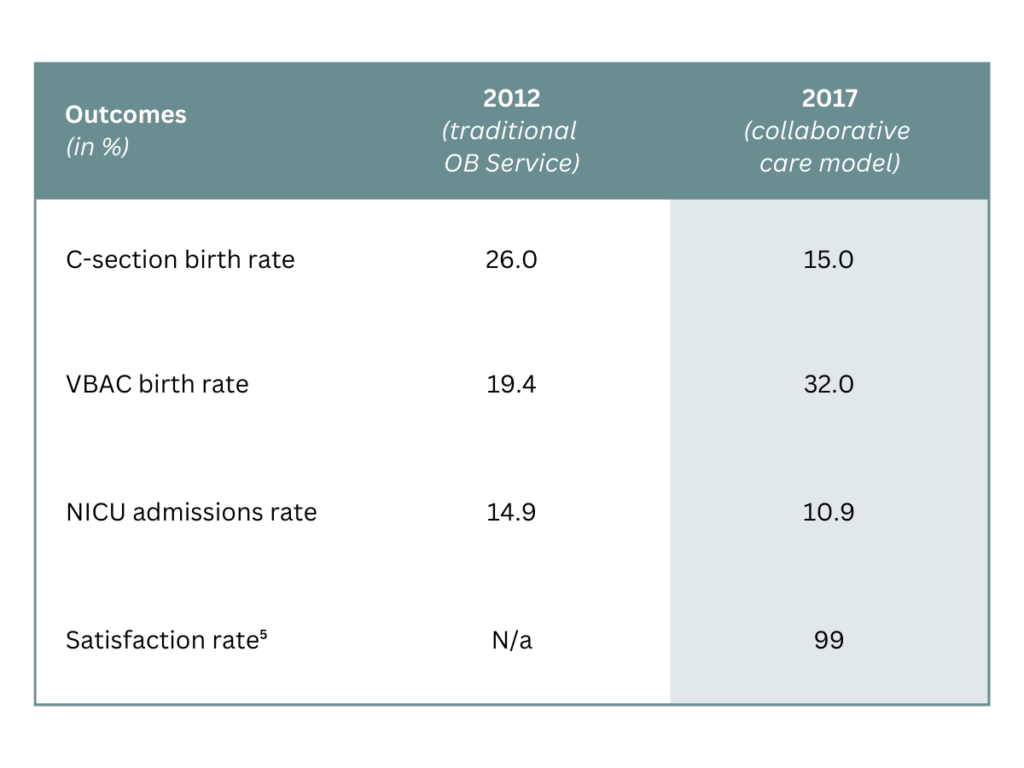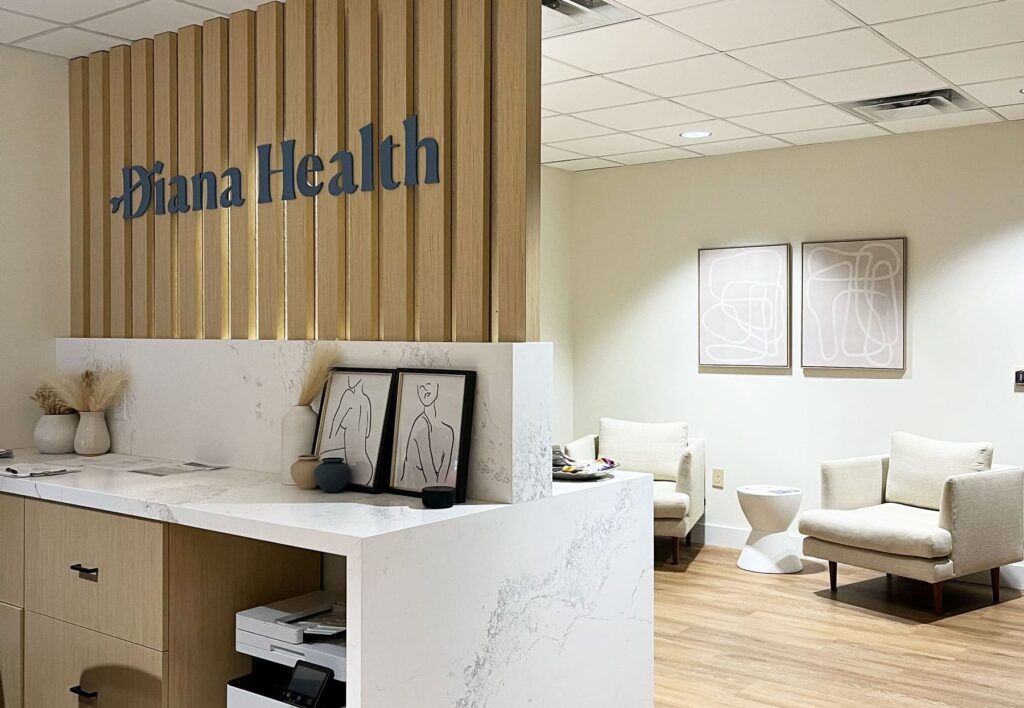At Norwest, we strive to partner with companies that demonstrate a positive impact on all three “Ps” in the healthcare system: Patient, Provider, and Payor. Companies that align incentives and deliver benefits for all three stakeholders are all too rare in the U.S. healthcare system. So, we are excited when we see new models that do.
Our latest portfolio company, Diana Health, creates this impact by applying an innovative model to women’s healthcare. We are grateful for the opportunity to support the company as it scales nationwide.
An Urgent Need to Improve Women’s Health and Maternal Care
Many areas of women’s health and maternal care need to improve. Female patients face issues such as limited access to care, minimal pre- and post-partum care, the overuse of medical interventions (e.g., C-section), and a challenged reimbursement profile across Medicaid payors. Ultimately, this results in a market that fails women, families, and the caregivers who serve them.
Maternal care outcomes are staggeringly poor in the United States. Among the 38 countries in the Organization for Economic Co-operation and Development (OECD), the U.S. is last in infant mortality, with 5.4 deaths per 1,000 live births compared to 1.6 in Norway, the best country. U.S. maternal mortality is also the worst in the OECD: 23.8 deaths per 1,000 compared to an average of 5.1 across all countries. Challenges are particularly acute for Black women, who face birth complications at a rate two to three times higher than white women — a symptom of broader underlying social and economic inequities rooted in racism and discrimination. Given the abysmal state of care, it may be no surprise that 45 percent of women in the U.S. experience some form of birth trauma.
These challenges are the symptoms of an unsustainable cost structure for hospitals that provide women’s health and maternal care services, which result in lower-quality care and limited access, particularly for Medicaid patients. (Close to 50 percent of U.S. births are covered by Medicaid.)
Many hospitals outside major metropolitan areas can no longer reconcile the high fixed costs of labor and delivery (L&D) departments with the limited reimbursements they receive. As a result, some 400 L&D facilities were closed between 2016 and 2020.
In addition, the U.S. faces a looming shortage of OB-GYNs. In 2020, the gap was around 2,600 providers. That number is estimated to exceed 22,000 by 2050 as providers reach retirement age and recruiting top talent becomes increasingly difficult. The trends toward fewer L&D departments and a shortage of OB-GYNs do not bode well for access to maternal care for many women.
A Huge Market Opportunity in Addressing These Problems
We believe that innovative companies that pursue collaborative care approaches, incorporating midwives and offering a differentiated business model – can provide better care for mothers and newborns. They also can produce improved financial results for hospitals and more cost-effective outcomes for payors.
The leading company pursuing this path is Diana Health. Founder and CEO Kate Condliffe is an experienced leader in healthcare innovation. Previously, she was COO of Baby & Co. and for many years was a senior leader of the Clinton Health Access Initiative. She co-founded Diana Health in 2020 alongside Jim Corum, an experienced hospital executive and the incubation arm of AlleyCorp, a New York venture capital firm with a strong position in healthcare. The company received Series A funding of $11 million in 2022. Diana Health currently has three locations in Tennessee, with plans to expand to Florida and additional states in the near future.


Today, we are excited to announce that Norwest is leading a Series B round of $34 million. All existing insider investors participated in the round, including .406 Ventures, LRV Health, and AlleyCorp.
A Holistic Approach to OB-GYN Practices and Women’s Health
Diana Health’s model is based on the principles of the midwifery model of care, which it deploys through a collaborative staffing structure, providing higher-quality care at a lower cost than most OB-GYN practices.
Traditional OB-GYN practices require high patient volumes for a practice to be financially sustainable. As a result, women who come in for a prenatal visit are often seen by an OB-GYN for only five to 10 minutes per visit with just enough time to do a quick physical exam. Diana emphasizes Certified Nurse Midwife (CNM)-led care for healthy, low-risk pregnancies and well-woman visits. This frees up OB-GYNs to focus on higher-risk pregnancies and gynecological visits and procedures.
Diana also uses an integrated care team – including health coaches, licensed clinical social workers, and health educators – to support whole-person health needs. In contrast to the quick prenatal visit in traditional OB-GYN practices, the CNM-led collaborative model provides 30- to 60-minute sessions with more frequent touchpoints throughout the pregnancy journey. In the Diana model, midwives are the primary providers during pregnancy, childbirth, and the postpartum period, working in collaboration with obstetricians and other healthcare professionals when necessary. The midwifery-led model emphasizes partnership, informed choice, and continuity of care. It is a holistic approach to maternal health, recognizing that pregnancy and childbirth are natural processes that require individualized care and support. This care model has been shown to improve outcomes for women and infants. Among them are lower rates of interventions such as cesarean sections, and fewer preterm births, as this review by the Mayo Clinic shows:

Midwifery-led care is still uncommon in the U.S., with only about 12 percent of births attended by midwives. In many developed countries, midwives attend up to 70 percent of births. We believe this represents a significant opportunity to expand Diana’s approach throughout the country.
Why We’re Excited About Diana Health
Diana Health aligns incentives for all stakeholders and has seen early signs of improvement in clinical and financial outcomes.
Diana’s highly differentiated business model has three core elements:
- Dedicated 24/7 clinics, often co-located with a hospital, offering comprehensive care for mothers before, during, and after birth. This care is provided in a comfortable, affirming environment that includes many valuable ancillary services, such as family planning, mental health therapy, health and wellness coaching, and classes.
- Partnership with mid-sized hospitals (500-1,500 annual births), who turn over their OB-GYN practice and L&D operations to Diana Health for a flat annual fee, generating an immediate ROI.
- CNMs provide the bulk of routine services, freeing up OB-GYNs to handle more complex cases, plus an integrated care delivery team to create an improved patient experience.
Diana Health creates a quadruple win for all parties involved:
- Women receive higher-quality, more personalized care.
- Underserved populations and communities keep or increase access to maternal care.
- Hospitals replace a money-losing department with the potential for a higher-margin line of services.
- Payors see their reimbursements spent more effectively with improved outcomes.

Results from the last 18 months of operation at Diana’s launch sites in Tennessee have been promising – including increased overall delivery and visit volume for their partner hospitals, improved patient outcomes through a reduction in C-sections and NICU stays, and higher patient and physician satisfaction. We are encouraged by this tremendous progress and are looking forward to this impact expanding to other communities as Diana Health expands nationwide.
Diana Health is bringing long-needed innovation to the women’s health and maternal care market. We are proud to be partnering with such a promising, forward-thinking company.





